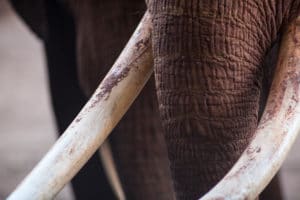The loophole for ivory purchased before 1977 has been closed.
To many Californians, the ivory trade is barbaric — killing or harming majestic animals such as elephants and rhinoceroses to get their horns or tusks. Yet for years, the ivory trade flourished across California, in part due to a loophole in state law that allowed merchants to continue to sell ivory that they purchased before 1977.
In 2015, the state tightened the law, banning the purchase, sale and importation of all ivory that comes from hippopotamus teeth, the tusks of elephants, mammoths, mastodons, narwhals, walruses, warthogs and whales, and rhinoceros horns. Assembly Bill 96 took effect in July 2016, and was approved by Governor Brown in October 2015. The basis for the law is that poaching presents a serious threat to the existence of animals such as elephants and rhinos, many of which face extinction due to these practices. The ivory trade is centered in Africa, and merchandise is often created in East Asia and China. The United States is one of the world’s largest consumers of ivory, including in California, where the loophole allowed sellers to evade enforcement of the prohibition against selling ivory.
Recently, criminal charges against several sellers of ivory merchandise were filed in Los Angeles. This represents the first time that anyone has been charged under the new state law, according to state prosectors. Each of the three sellers were charged with misdemeanors for selling ivory items, and are facing a maximum penalty of $40,000 and one year in prison for each violation. The first defendant, Anthony Buccola of Antonio’s Bella Casa, is accused of selling narwal ivory tusks for $35,000 each. Narwals are a rare whale found in oceans off of Canada and Greenland. There are only 50,000 narwals remaining, and countries around the world have enacted bans prohibiting the sale and importation of narwal tusks due to the endangered status of these animals. The second defendant, Oleg Chakov, was charged with attempting to sell nine ivory sculptures valued at $3,000 via Craigslist. The third defendant, Mark Slotkin of Antiquarian Traders, was accused of selling ivory art deco pieces and mounted animals valued at between $4,500 and $30,000 at his stores in Beverly Hills and Los Angeles.
The new ivory laws seem draconian to anyone who may have engaged in a trade for a substantial period of time, such as Mr. Slotkin, who stated that the pieces in question had been in his warehouse for 25 years. However, under this new law, it appears that the state of California will have no tolerance for any sale or importation of ivory items.
While this law may only be applied to a handful of people, it highlights how the law is constantly changing. A skilled Los Angeles criminal defense attorney can help to ensure that you are protected, and can defend you if you are charged with a crime. Contact the Chambers Law Firm today at 714-760-4088 or dchambers@clfca.com to learn how we can defend your rights and your freedom.





